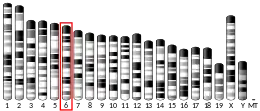TAS2R31
Taste receptor, type 2, member 31, also known as TAS2R31, is a protein which in humans is encoded by the TAS2R31 gene.[5] This bitter taste receptor has been shown to respond to saccharin in vitro.[6]
| TAS2R31 | |||||||||||||||||||||||||||||||||||||||||||||||||||
|---|---|---|---|---|---|---|---|---|---|---|---|---|---|---|---|---|---|---|---|---|---|---|---|---|---|---|---|---|---|---|---|---|---|---|---|---|---|---|---|---|---|---|---|---|---|---|---|---|---|---|---|
| Identifiers | |||||||||||||||||||||||||||||||||||||||||||||||||||
| Aliases | TAS2R31, T2R31, T2R44, T2R53, TAS2R44, taste 2 receptor member 31 | ||||||||||||||||||||||||||||||||||||||||||||||||||
| External IDs | OMIM: 612669 MGI: 2681304 HomoloGene: 136304 GeneCards: TAS2R31 | ||||||||||||||||||||||||||||||||||||||||||||||||||
| |||||||||||||||||||||||||||||||||||||||||||||||||||
| |||||||||||||||||||||||||||||||||||||||||||||||||||
| |||||||||||||||||||||||||||||||||||||||||||||||||||
| |||||||||||||||||||||||||||||||||||||||||||||||||||
| |||||||||||||||||||||||||||||||||||||||||||||||||||
| Wikidata | |||||||||||||||||||||||||||||||||||||||||||||||||||
| |||||||||||||||||||||||||||||||||||||||||||||||||||
TAS2R31 is also expressed in the smooth muscle of human airways, along with several other bitter taste receptors. Their activation in these cells causes an increase in intracellular calcium ion, which in turn triggers the opening of potassium channels which hyperpolarize the membrane and cause the smooth muscle to relax. Hence, activation of these receptors leads to bronchodilation.[7]
Polymorphisms in this gene have been associated with the perceived bitterness of sweetener acesulfame potassium.[8]
See also
References
- ENSG00000263097, ENSG00000282256 GRCh38: Ensembl release 89: ENSG00000256436, ENSG00000263097, ENSG00000282256 - Ensembl, May 2017
- GRCm38: Ensembl release 89: ENSMUSG00000053217 - Ensembl, May 2017
- "Human PubMed Reference:". National Center for Biotechnology Information, U.S. National Library of Medicine.
- "Mouse PubMed Reference:". National Center for Biotechnology Information, U.S. National Library of Medicine.
- "Entrez Gene: TAS2R31 taste receptor, type 2, member 31".
- Kuhn C, Bufe B, Winnig M, Hofmann T, Frank O, Behrens M, Lewtschenko T, Slack JP, Ward CD, Meyerhof W (November 2004). "Bitter taste receptors for saccharin and acesulfame K". J. Neurosci. 24 (45): 10260–5. doi:10.1523/JNEUROSCI.1225-04.2004. PMC 6730199. PMID 15537898.
- Deshpande DA, Wang WC, McIlmoyle EL, Robinett KS, Schillinger RM, An SS, Sham JS, Liggett SB (November 2010). "Bitter taste receptors on airway smooth muscle bronchodilate by localized calcium signaling and reverse obstruction". Nat. Med. 16 (11): 1299–304. doi:10.1038/nm.2237. PMC 3066567. PMID 20972434.
- Allen AL, McGeary JE, Knopik VS, Hayes JE (2013). "Bitterness of the non-nutritive sweetener acesulfame potassium varies with polymorphisms in TAS2R9 and TAS2R31". Chem. Senses. 38 (5): 379–89. doi:10.1093/chemse/bjt017. PMC 3657735. PMID 23599216.
Further reading
- Margolskee RF (2002). "Molecular mechanisms of bitter and sweet taste transduction". J. Biol. Chem. 277 (1): 1–4. doi:10.1074/jbc.R100054200. PMID 11696554.
- Montmayeur JP, Matsunami H (2002). "Receptors for bitter and sweet taste". Curr. Opin. Neurobiol. 12 (4): 366–71. doi:10.1016/S0959-4388(02)00345-8. PMID 12139982. S2CID 37807140.
- Bufe B, Hofmann T, Krautwurst D, Raguse JD, Meyerhof W (2002). "The human TAS2R16 receptor mediates bitter taste in response to beta-glucopyranosides". Nat. Genet. 32 (3): 397–401. doi:10.1038/ng1014. PMID 12379855. S2CID 20426192.
- Zhang Y, Hoon MA, Chandrashekar J, Mueller KL, Cook B, Wu D, Zuker CS, Ryba NJ (2003). "Coding of sweet, bitter, and umami tastes: different receptor cells sharing similar signaling pathways". Cell. 112 (3): 293–301. doi:10.1016/S0092-8674(03)00071-0. PMID 12581520. S2CID 718601.
- Conte C, Ebeling M, Marcuz A, Nef P, Andres-Barquin PJ (2003). "Identification and characterization of human taste receptor genes belonging to the TAS2R family". Cytogenet. Genome Res. 98 (1): 45–53. doi:10.1159/000068546. PMID 12584440. S2CID 1542970.
- Pronin AN, Tang H, Connor J, Keung W (2005). "Identification of ligands for two human bitter T2R receptors". Chem. Senses. 29 (7): 583–93. doi:10.1093/chemse/bjh064. PMID 15337684.
- Fischer A, Gilad Y, Man O, Pääbo S (2005). "Evolution of bitter taste receptors in humans and apes". Mol. Biol. Evol. 22 (3): 432–6. doi:10.1093/molbev/msi027. PMID 15496549.
- Kuhn C, Bufe B, Winnig M, Hofmann T, Frank O, Behrens M, Lewtschenko T, Slack JP, Ward CD, Meyerhof W (2005). "Bitter taste receptors for saccharin and acesulfame K." J. Neurosci. 24 (45): 10260–5. doi:10.1523/JNEUROSCI.1225-04.2004. PMC 6730199. PMID 15537898.
This article incorporates text from the United States National Library of Medicine, which is in the public domain.



